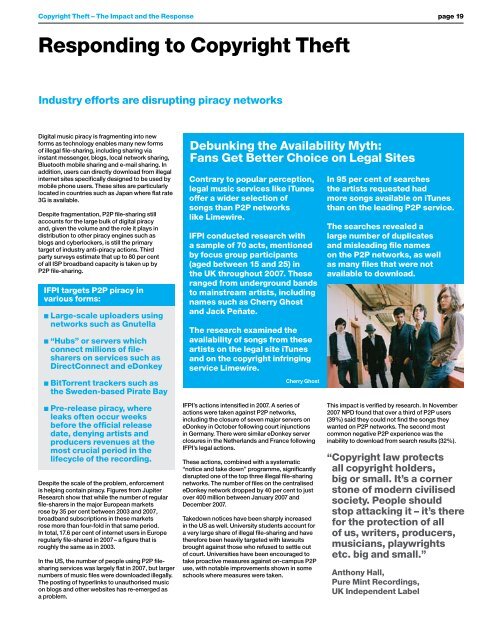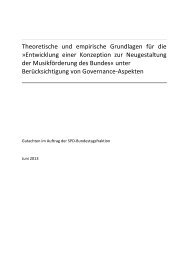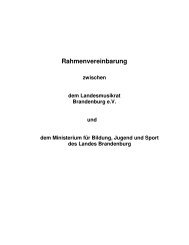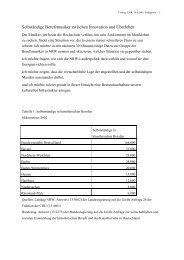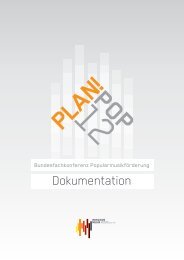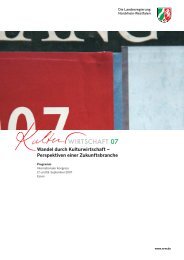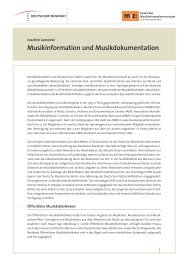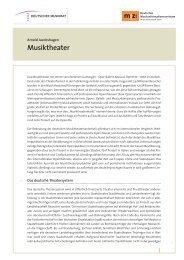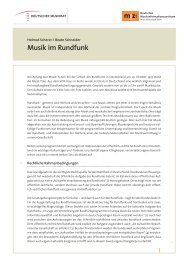Create successful ePaper yourself
Turn your PDF publications into a flip-book with our unique Google optimized e-Paper software.
Copyright Theft – The Impact and the Response page 19<br />
Responding to Copyright Theft<br />
Industry efforts are disrupting piracy networks<br />
<strong>Digital</strong> music piracy is fragmenting into new<br />
forms as technology enables many new forms<br />
of illegal file-sharing, including sharing via<br />
instant messenger, blogs, local network sharing,<br />
Bluetooth mobile sharing and e-mail sharing. In<br />
addition, users can directly download from illegal<br />
internet sites specifically designed to be used by<br />
mobile phone users. These sites are particularly<br />
located in countries such as Japan where flat rate<br />
3G is available.<br />
Despite fragmentation, P2P file-sharing still<br />
accounts for the large bulk of digital piracy<br />
and, given the volume and the role it plays in<br />
distribution to other piracy engines such as<br />
blogs and cyberlockers, is still the primary<br />
target of industry anti-piracy actions. Third<br />
party surveys estimate that up to 80 per cent<br />
of all ISP broadband capacity is taken up by<br />
P2P file-sharing.<br />
<strong>IFPI</strong> targets P2P piracy in<br />
various forms:<br />
n Large-scale uploaders using<br />
networks such as Gnutella<br />
n “Hubs” or servers which<br />
connect millions of filesharers<br />
on services such as<br />
DirectConnect and eDonkey<br />
n BitTorrent trackers such as<br />
the Sweden-based Pirate Bay<br />
n Pre-release piracy, where<br />
leaks often occur weeks<br />
before the official release<br />
date, denying artists and<br />
producers revenues at the<br />
most crucial period in the<br />
lifecycle of the recording.<br />
Despite the scale of the problem, enforcement<br />
is helping contain piracy. Figures from Jupiter<br />
Research show that while the number of regular<br />
file-sharers in the major European markets<br />
rose by 35 per cent between 2003 and 2007,<br />
broadband subscriptions in these markets<br />
rose more than four-fold in that same period.<br />
In total, 17.6 per cent of internet users in Europe<br />
regularly file-shared in 2007 – a figure that is<br />
roughly the same as in 2003.<br />
In the US, the number of people using P2P filesharing<br />
services was largely flat in 2007, but larger<br />
numbers of music files were downloaded illegally.<br />
The posting of hyperlinks to unauthorised music<br />
on blogs and other websites has re-emerged as<br />
a problem.<br />
Debunking the Availability Myth:<br />
Fans Get Better Choice on Legal Sites<br />
Contrary to popular perception,<br />
legal music services like iTunes<br />
offer a wider selection of<br />
songs than P2P networks<br />
like Limewire.<br />
<strong>IFPI</strong> conducted research with<br />
a sample of 70 acts, mentioned<br />
by focus group participants<br />
(aged between 15 and 25) in<br />
the UK throughout 2007. These<br />
ranged from underground bands<br />
to mainstream artists, including<br />
names such as Cherry Ghost<br />
and Jack Peñate.<br />
The research examined the<br />
availability of songs from these<br />
artists on the legal site iTunes<br />
and on the copyright infringing<br />
service Limewire.<br />
Cherry Ghost<br />
<strong>IFPI</strong>’s actions intensified in 2007. A series of<br />
actions were taken against P2P networks,<br />
including the closure of seven major servers on<br />
eDonkey in October following court injunctions<br />
in Germany. There were similar eDonkey server<br />
closures in the Netherlands and France following<br />
<strong>IFPI</strong>’s legal actions.<br />
These actions, combined with a systematic<br />
“notice and take down” programme, significantly<br />
disrupted one of the top three illegal file-sharing<br />
networks. The number of files on the centralised<br />
eDonkey network dropped by 40 per cent to just<br />
over 400 million between January 2007 and<br />
December 2007.<br />
Takedown notices have been sharply increased<br />
in the US as well. University students account for<br />
a very large share of illegal file-sharing and have<br />
therefore been heavily targeted with lawsuits<br />
brought against those who refused to settle out<br />
of court. Universities have been encouraged to<br />
take proactive measures against on-campus P2P<br />
use, with notable improvements shown in some<br />
schools where measures were taken.<br />
In 95 per cent of searches<br />
the artists requested had<br />
more songs available on iTunes<br />
than on the leading P2P service.<br />
The searches revealed a<br />
large number of duplicates<br />
and misleading file names<br />
on the P2P networks, as well<br />
as many files that were not<br />
available to download.<br />
This impact is verified by research. In November<br />
2007 NPD found that over a third of P2P users<br />
(39%) said they could not find the songs they<br />
wanted on P2P networks. The second most<br />
common negative P2P experience was the<br />
inability to download from search results (32%).<br />
“ Copyright law protects<br />
all copyright holders,<br />
big or small. It’s a corner<br />
stone of modern civilised<br />
society. People should<br />
stop attacking it – it’s there<br />
for the protection of all<br />
of us, writers, producers,<br />
musicians, playwrights<br />
etc. big and small.”<br />
Anthony Hall,<br />
Pure Mint Recordings,<br />
UK Independent Label


